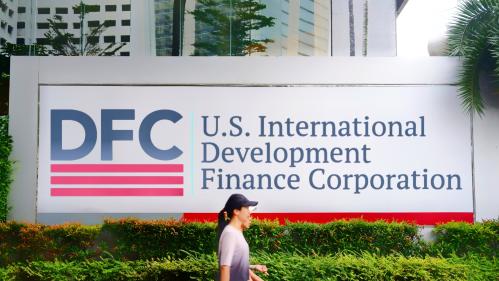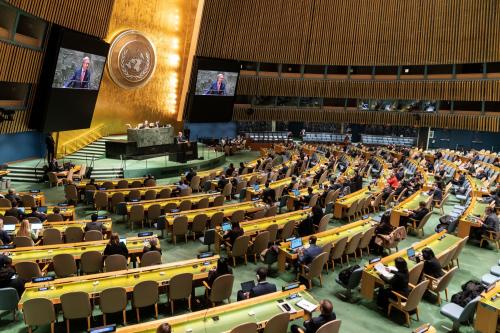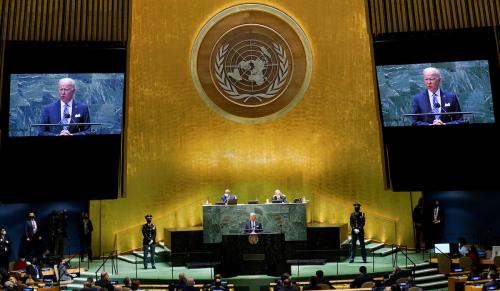Last month, India passed the baton of the G20 presidency to Brazil after a record year of elevating the importance of digital public infrastructure (DPI)—an approach to designing and governing foundational systems to maximize inclusion, innovation, and availability of digital capabilities.
Brazil’s assumption of the G20 presidency marks an opportunity to advance the momentum to ensure digital technology and data sharing effectively meet the needs of the Global South. Why the G20? Because it serves as a venue for developing commitment and consensus among the leaders of the economically most powerful countries that control most digital technology and the leaders of major Southern economies. The development and sustainability of DPI is not just a government enterprise but also requires the commitment and engagement of the private sector and civil society organizations, which are represented in the G20 Engagement Groups and the T20. The availability of DPI is essential to avoid developing countries being left behind and making progress toward SDGs.
Given Brazil’s stated interest in emphasizing data-sharing infrastructure, which is a key component of safe and inclusive DPI, Brazil can build consensus that data is a strategic asset for poverty reduction and tackling global crises like climate change. In so doing, the G20 discourse on data sharing would offer an important complement to the G7 discourse on data protection and data free flow with trust to enable international trade. A marker of success will be Brazil’s ability to galvanize political and financial commitments toward the infrastructure and institutional governance structures that enable data to be more broadly available and utilized for inclusive growth.
Brazil is well poised to do this. Brazil has an impressive track record of establishing and leveraging digital infrastructure to advance its poverty alleviation and inclusive growth goals. Brazil’s Bolsa Familia program, which utilizes the Pix payments infrastructure, successfully reaches approximately 14 million families through distribution by the government-owned savings bank, Caixa. This conditional cash transfer initiative has significantly contributed to the dramatic reduction in poverty and enhancement of social outcomes since its inception during the first presidency of Luiz Inácio Lula da Silva. Brazil has also made great strides in the provision of government services via gov.br which streamlines the citizen-to-government interface.
Rising to the forefront: A brief look at the role of digital technology in the G20
The G20 has proved to be a flexible vehicle for fostering discussion on issues of immediate concern for this group that accounts for approximately 85% of the global GDP, over 75% of global trade, 75% of global emissions, and about two-thirds of the world’s population. The group does not have an ongoing fixed agenda and relies on a rotating presidency to establish the priorities for any given year. In this way, the current needs of members can rise to the forefront, especially for the country that holds the presidency.
The growing importance of digital technology within the G20 structure exemplifies the agility of the group’s agenda and signals the importance of international cooperation for technology to drive shared prosperity. The Digital Economy Task Force (DETF), created in 2017 during the German presidency of the G20, was converted into a permanent working group in 2021. During these years, there has been shared recognition of the need to invest in the digitally unconnected, support digital literacy, and related topics.
Unfortunately, the working group has struggled to disentangle digital policies from broader geopolitical positions. For example, the Indonesian presidency’s outcomes document noted the objections to discussing activities that disrupt digital connectivity claiming these issues are out of scope for the Digital Economy Working Group (DEWG). It is hardly surprising that consensus could not be reached on such issues at a time when India was leading the world in annual internet shutdowns, Russia’s ongoing cyber-attacks in Ukraine, and China’s censorship of content on the internet.
India’s leadership: Building consensus in a contentious era
Despite the growing geopolitical nature of DEWG topics, last year’s Indian presidency was successful in not only elevating digital issues but also strongly asserting a detailed approach to fostering inclusive, interoperable, affordable, and competitive digital economies through DPI. This outcome was not a foregone conclusion. Debates were ongoing regarding internet shutdowns, data sovereignty, and much more. Moreover, India was introducing new terminology of DPI that few had heard before.
Yet the G20 Summit in New Delhi ended in a comprehensive Leaders’ Declaration with a framework for implementing DPI, a repository of DPI solutions, and, importantly, a recognition that financing of digital public infrastructure needs to be holistic and multistakeholder in nature. The group recognized that the promise of DPI could go unrealized—or worse yet, undermine individual privacy and national security. They called on a comprehensive approach that brings together the private sector, civil society, government, and financing institutions that can advance technology infrastructure along with the institutional and policy safeguards that together drive a human-centric approach to digital transformation. With this in mind, the Government of India subsequently announced the creation of a Social Impact Fund. While the initial funding is a modest $25 million, what remains to be seen is which countries and partners will join this effort.
Brazil’s opportunity: Breaking new ground with a strong data agenda
The Brazilian presidency represents the third phase of a cycle initiated in 2022 of G20 leadership from emerging economies, set to continue until 2025. This period provides a unique opportunity to highlight the priorities of the Global Majority for the digital economy agenda. It’s encouraging to see that the Brazilian presidency is maintaining the momentum around DPI in placing digital government on the proposed agenda. Their focus includes improving the relationship between governments and their citizens by building a secure and inclusive digital public infrastructure. In addressing the topic with an emphasis on digital identification and data sharing as key enablers, the Brazilian presidency has taken a step forward in advancing the global DPI discourse.
The data-sharing agenda of the G20 holds special relevance to emerging economies, which are increasingly acknowledging data as a strategic asset that can be harnessed for inclusive growth and social gains. According to one recent study, $1 of investment in a country’s data infrastructure and ecosystem generates $32 of economic return. Yet data ecosystems within and across national borders remain fragmented, stymied by siloed investment in country-specific digital capabilities rather than the sharing of solutions as public goods.
How to make 2024 meaningful
Brazil can build on this impressive legacy by emphasizing data sharing as the next enabler of poverty reduction and in addressing global challenges such as climate action. Specifically, it should:
- Connect data sharing to concrete change for people. Building on the work of past G20 meetings, Brazil has a chance to solidify the position that data and data sharing must be understood as a strategic asset for broad-based use to solve real and timely problems, such as connecting to the broader Brazilian priorities of poverty reduction and climate action. Brazil can do so by cataloging the many ways data can support improved policies, empower individuals with health data, fuel startup ecosystems, and much more. In doing so, there can be an informed debate on the policies and governance structures that allow for permissioned use of data by a broad set of stakeholders.
- Unlock DPI. There simply isn’t time for the G20 to deliberate for years because the landscape of technology and digitalization is evolving with or without policymakers. The goal is not for the G20 leaders to have the answers but, rather, to unlock the financing for research, infrastructure, and agile policy tools that are needed. The Digital Impact Alliance estimates $450 million annually is needed to support the ecosystem enablers for DPI that can make the global 50-in-5 campaign a success.
- Bring African voices to the table. With the African Union now a permanent member of the G20, Brazil and other members can help make sure African voices are at the table alongside their peers. There are dozens of working group meetings that culminate in the annual Leaders Summit. Meaningful participation of low-resourced institutions and governments will require deliberate support from others in the form of staff and travel. This will be particularly important if Brazil follows India’s lead in using the presidency to offer facilitated workshops, research collaborations, and other informative events that make the G20 a true platform for knowledge sharing and discourse.
- Build consensus on global data safeguards. Perhaps the most meaningful outcome of Brazil’s presidency on digital issues could be a framework for establishing practical national and global safeguards around data. Many of the harms experienced today online—from market concentration, misinformation, surveillance, and systemic bias in artificial intelligence that can harm women and other groups—are all related to how data is collected, shared, and used. In recognizing this, Brazil can begin to drive consensus on meaningful institutional responses for data governance. These might include: (a) consumer protections such as automated consumer complaint databases; (b) test tools that ensure technology systems comply with good practice; (c) scorecards for benchmarking country performance and citizen outcomes; and (d) common research approaches to surface the lived experiences of people. Such a framework can strengthen the broad effort of UNDP and the U.N. Tech Envoy’s Office to develop a Universal Safeguards Framework for Digital Public Infrastructure.
In this increasingly fractious world, the G20 remains an important forum for the largest and most influential economies to come together around common challenges. It should not miss this opportunity to address how to safely and securely leverage data for broad benefit in ways that simultaneously drive innovation, empower people, and stymie misuse.
The Brookings Institution is committed to quality, independence, and impact.
We are supported by a diverse array of funders. In line with our values and policies, each Brookings publication represents the sole views of its author(s).









Commentary
Brazil’s G20 opportunity: A consensus on digital data
January 9, 2024